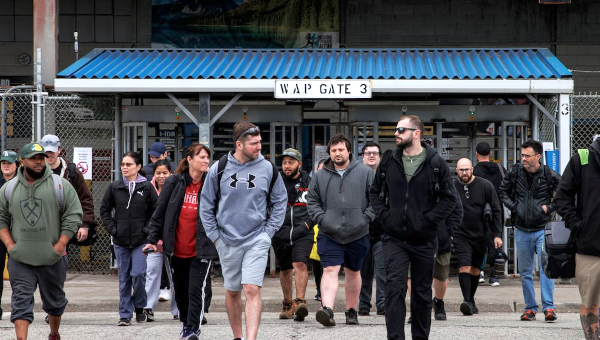Tax Revolt Destabilizes Government in British Columbia
What were they thinking? Mere days after its re-election in May 2009, the Liberal Party government of British Columbia announced a new consumption tax that took effect on July 1, 2010 and will fleece an estimated $1.9-billion from taxpayer pockets in the first year. It hadn’t breathed a word of the tax during the election campaign, except to deny it was considering it.
Now the contemptuous ruse is backfiring, badly. The government is facing a tax revolt that challenges its moral authority to govern and could eventually unseat it.
Another provincial government, Ontario, imposed the tax on the same date. It has met much less opposition.
Fight to Repeal the Tax
The Harmonized Sales Tax (HST) in British Columbia merges the existing seven per cent provincial sales tax (PST) into the five per cent federal Goods and Services Tax (GST) regime. Three big changes result. One, the HST applies to a lot more categories of purchases than the provincial sales tax.
Two, it shifts a large tax burden away from business and onto individuals and families, principally because businesses will get input tax credits to recover the HST paid on most expenditures previously subject to the provincial sales tax. The government estimates this will save business some $2-billion in taxes in the first year alone.
Three, the new tax will be fully administered by the federal government, reducing administration costs.
A petition to force a repeal of the tax in BC was launched several months ago under the terms of provincial referendum legislation. Its organizers gathered more than 700,000 signatures which they delivered to the province’s electoral authority on June 30. The government now has two choices: either it submits repeal legislation accompanying the petition to a vote in the provincial legislature, or it must submit the tax to a referendum vote by September 2011.
A vote of 50 per cent or more must be achieved in two thirds of the electoral districts in the province in order to repeal the tax. There must also be a voter turnout of more that 50 per cent in all districts. Petition organizers are confident such a vote would be won, but there’s a further rub. The provincial legislature can simply vote down repeal legislation, though it would do so at even greater peril.
Because they introduced the tax on the sly, believing it would meet only token opposition, the government and its business supporters have been caught entirely off guard by the scope of public reaction and anger. Electoral law prevented them from advertising during the petition campaign. Only now are they gearing up to wage a propaganda war in favour of the tax.
A coalition of business interests, including the Mining Association of BC, the Coast Forest Products Association and the BC Chamber of Commerce, has asked the province’s Supreme Court to quash the petition, arguing that the tax falls under federal, not provincial, jurisdiction. The court will hear the arguments within a month.
Philip Hochstein of the Independent Contractors and Businesses Association of BC warned in the Globe and Mail on June 25, “There appears to have been a fundamental breach of trust between the government and the people. I think it would be a mistake if they don’t reach out to their party supporters. If they don’t do that, they will lose the next election.”
Meanwhile, petition organizers have launched their own legal action, asking the courts to quash the tax because it was not voted by the legislature; the cabinet merely adopted an order-in-council authorizing the government to enter an agreement with the federal government to impose the HST in British Columbia.
Huge Shift in Tax Burden
A study by Statistics Canada commissioned by the Victoria Times Colonist shows that all income groups will pay more taxes as a result of the HST. It says the average annual hit on households will be $521. The poorest in the province will be cushioned from the tax by rebates, but only provided they fill out the necessary income tax returns, and only so long as rebates remain in place. Consumption taxes hit hardest at families forced to spend most of their income on basic goods and services, and this one is no exception.
Liberal and Conservative federal governments have pushed hard for provincial governments to switch over to a harmonized sales tax, including offering financial compensation for revenue shortfall. BC will receive a one-time transfer of $1.6-billion to compensate.
HST proponents argue, correctly, that it will lower the taxes paid by businesses. From there, their advocacy enters into a fairy tale world where fewer taxes on businesses result in more business investment and therefore more employment and more income tax revenues to pay for government programs. Everyone wins, companies and workers alike. Even better, companies will lower their final consumer prices in grateful recognition of the reduction of their tax obligations!
Similar arguments were made by a federal Conservative Party government and big business when the government introduced the GST, in 1991. The new tax replaced a long-standing manufacturing sales tax paid by companies when they purchased input goods. The net result of the GST was a similar shift in the tax burden from corporations to consumers, with no meaningful benefit to working class people.
Three of four provinces in Atlantic Canada switched to the HST regime more than ten years ago. (Quebec also adopted the HST but administers the tax itself.) Curiously, the anti-tax protest in BC has been directed exclusively against the provincial government, ignoring the key role played by the federal government in promoting and administering it.
Petition Drive Targets ‘Big Corporations’
Opposition to the tax is widespread. The petition campaign is spearheaded by Bill Vander Zalm, premier of the province from 1986 to 1991, and Chris Delaney, a former leader of the extreme-right BC Conservative Party. Thousands of campaign volunteers have been recruited to collect signatures and otherwise run the campaign.
The campaign’s success has Vander Zalm and Delaney holding considerable sway over the future direction of the Liberal Party government. Their weapon is the province’s recall legislation. If 50% of eligible voters in any electoral district sign the required petition, the electoral authority is obliged to convene a by-election. The government holds a 14-seat majority over the opposition NDP. Vander Zalm and Delaney say they will use the recall threat to pressure the government.
On June 22, they announced they have drawn up a list of 24 members of the provincial legislature who could be targeted for recall. “We have 7,000 troops that want to carry on,” said Vander Zalm. “We will accommodate them.”
A right of recall comes into effect 18 months following an election. That will be on November 15.
Trade unions and the NDP have identified with the campaign. Pro-NDP commentator Bill Tieleman is the third member of the steering committee of the campaign, though strictly as second fiddle.
The NDP calls Vander Zalm “the worst premier that BC ever had.” Many working people recall the deep cuts to social services that his government carried out. But Vander Zalm is nothing if not an experienced demagogue. He delivers an appealing anti-tax message, telling CBC Radio on June 29, for example, “This government is all about looking after big corporations and they’ve shown it again.”
While delivering the 700,000 signatures to the electoral authority the next day, he repeated the same theme, responding to the just-announced court challenge by saying, “We will be in court two weeks from now standing up to the big corporations and to a government that wants to punish the people.”
NDP and Unions Tail-end Right-wing Antitaxers
Opposition to the HST from the New Democratic Party and its trade union backers has been little more than token. Neither the NDP nor the BC Federation of Labour websites feature the anti-HST campaign. The federation website makes no mention at all of the HST. It does not promote the petition at worksites.
The NDP’s website contains two press releases on the HST over the past three months. Neither release mentions the petition/repeal drive.
The NDP has failed to voice a progressive alternative to the HST. The party’s principal message on the HST is that it will slow economic activity by undermining “consumer confidence” and will hurt service industries such as tourism and restaurants that were exempt from the provincial sales tax but will now have to charge the HST.
Since the defeat of its last government in 2001, the NDP has bent over backwards to display a loyalty to business interests, including attempts to weaken the role of affiliated unions in party life. Party leader Carole James has lost two provincial elections preaching a pro-business theme, in 2005 and 2009. The party’s total vote actually declined between those two elections.
The Green Party has followed a similar, pro-business course and has suffered even sharper vote declines than the NDP.
Without a meaningful alternative to the governing party, many working class voters have simply turned away from electoral politics. Voter turnout in 2009 reached an historic low, less than 50% of eligible voters.
Despite massive cuts to jobs, social services and quality of life since 2001 – including, remarkably, a minimum wage that has remained frozen at $8 per hour since 2001 and is now the lowest in Canada – only a few trade union challenges to the government of Premier Gordon Campbell have been mounted. The most significant was the hospital workers strike of April/May, 2004. A general strike in support of the workers was set for May 4, but it was called off the night before by Federation of Labour leaders and the strike went down to a bitter defeat.
Right-wing demagogues hope to translate a successful anti-HST campaign into longer term political gains, such as further cuts to government programs as a result of future tax cuts. But they face several difficulties along this road.
One is the divisions among themselves. Big business has lined up squarely for the tax, and so has the right-wing think tank, the Fraser Institute, always a darling of the right wing.
Another is that most supporters of the Vander Zalm-led campaign do not share the view that “less government is good.” On the contrary, support is fuelled by popular opposition to the deep cuts in social and environmental programs by the same federal and provincial governments that have imposed the new tax.

Parents and community members occupy the Dunster Fine Arts School. [See YouTube video.]
The campaign against the HST should not be the exclusive reserve of populist demagogues. The unions and other progressive organizations should fight for policies that ease the tax burden on working people. They should demand higher taxes on corporations and the wealthy in order to pay for urgently needed improvements to social programs and services and to environmental protection.
Many working people are sceptical of the claims that lower taxes and higher profits for corporations benefit society as a whole. There is every reason to anticipate that they would support an anti-HST campaign centered not just on a repeal of the tax but also on defending social programs and services and shifting the tax burden to the wealthy.
One good way to advance such a campaign is to vigorously support the struggles against cuts to education funding that are erupting in the province, notably the occupation of the elementary school in Dunster (northwest BC) to protest its scheduled closing and the demands by teachers and school board trustees in Vancouver that schools in the city receive more funding. •





